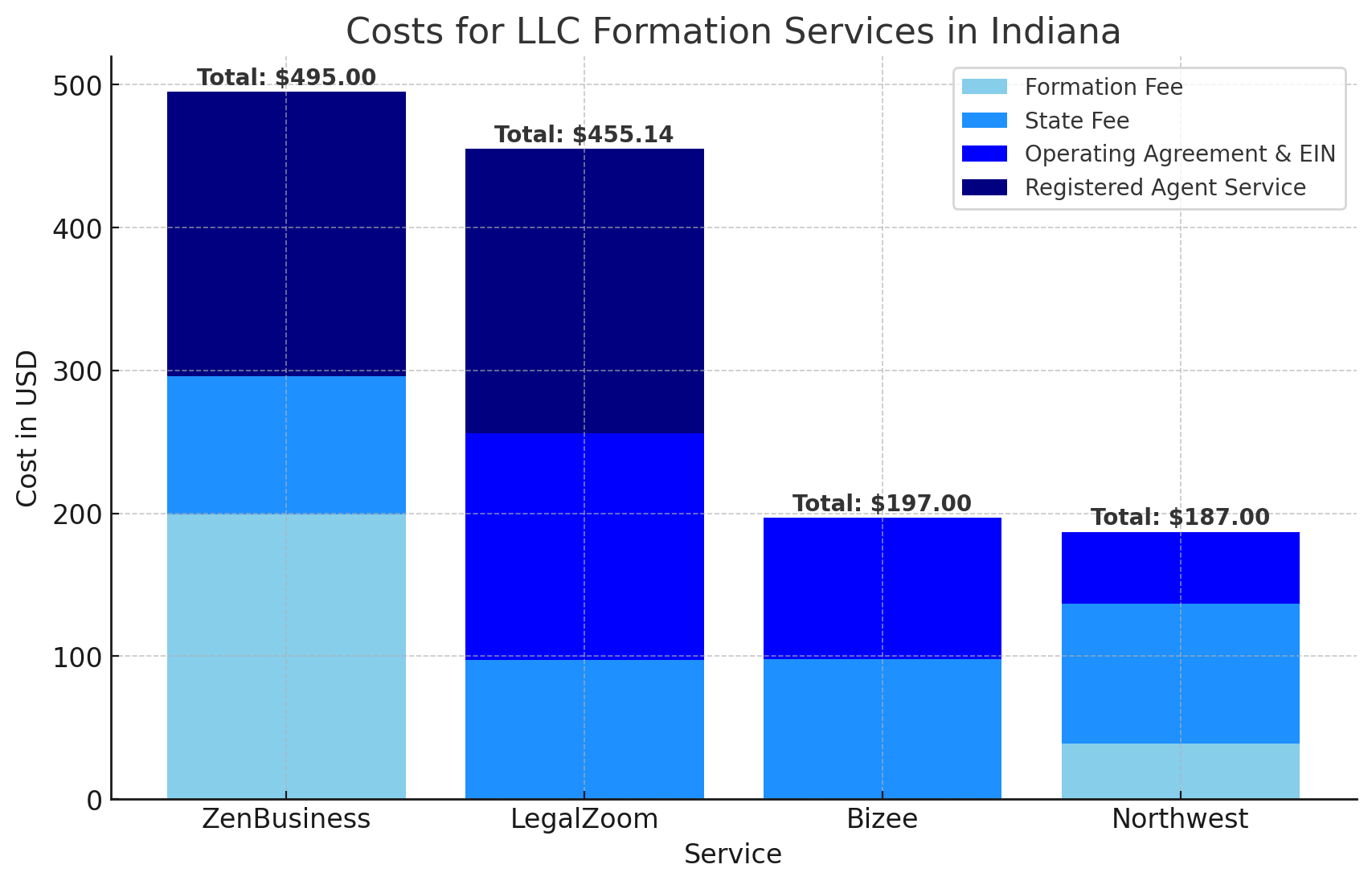Are you ready to establish your business in Indiana? Creating a Limited Liability Company (LLC) is a crucial step in bringing your entrepreneurial vision to life.
This guide simplifies the process of forming your LLC in Indiana, presenting each step in a clear and understandable manner. Suitable for both first-time founders and seasoned businesspersons, this article navigates through the vital aspects of Indiana LLC formation.
Options for Forming an LLC in Indiana
- Do-It-Yourself (DIY): Perfect for those who are comfortable with legal procedures and wish to handle matters independently.
Go to the Indiana Secretary of State’s website to set up the LLC and then to the IRS’s website to get your EIN (Employer Identification Number). - Hiring a Lawyer: Ideal for obtaining tailored legal advice, particularly in complex situations.
- Using a Formation Service: A practical, cost-effective choice for many. Recognized services include ZenBusiness, LegalZoom, Bizee, and our top pick, Northwest Registered Agent.

We aim to provide clear and expert guidance throughout your Indiana LLC formation journey.
Steps to Form an LLC in Indiana
- Choose Your LLC’s Name: Ensure the name is unique in Indiana and includes "Limited Liability Company" or its abbreviations.
Complying with Indiana’s naming guidelines is essential. Indiana’s rules for naming LLCs are detailed in Indiana Code § 23-0.5-3. - Designate a Registered Agent: Indiana law requires a registered agent with a physical address in the state to handle your LLC's legal paperwork.
- File the Articles of Organization: Submit this fundamental document to the Indiana Secretary of State. It outlines your LLC’s name, address, registered agent, and management structure. The filing fee is $95 online.
- Draft an Operating Agreement: Not mandatory in Indiana, yet vital for outlining your LLC's operational and financial procedures.
- Obtain an Employer Identification Number (EIN): Essential for tax and employment purposes, available through the IRS website.
- Open a Business Bank Account: Segregate your personal and business finances by creating a specific account for your LLC.
- Fund Your LLC: Capitalize your business through personal investments, loans, or other financing options.
- Ongoing Compliance: Maintain your LLC's good standing in Indiana by regularly filing Biennial Reports and understanding all relevant state requirements.
Establishing Your LLC with Northwest Registered Agent
Northwest Registered Agent makes the LLC formation process seamless. By clicking on the button below, you can use our affiliate link
and form your LLC in Indiana for only $39, plus state fees. This exclusive offer includes their registered agent service free for the first year, adding extra value and savings for your new venture.
We get commissions for purchases made through links in this post.
Legal Considerations and Compliance in Indiana
Ensuring compliance with Indiana-specific regulations is crucial. Maintain a compliant LLC by adhering to naming rules, having an accessible registered agent, and fulfilling all reporting duties promptly.
Benefits of Forming an LLC in Indiana
An Indiana LLC provides liability protection, potential tax advantages, and flexible operation. The state's supportive business environment fosters growth across various sectors.
Common Mistakes to Avoid
Common pitfalls include overlooking legal requirements or commingling personal and business funds. Stay informed and consider professional services to navigate complex legal landscapes.
Next Steps After Establishing Your LLC
After your LLC is set up, focus on crafting a solid business plan, implementing robust accounting practices, and marketing your services. Leverage available tools and services for efficient business management.
Conclusion
Choosing the right path for forming an LLC in Indiana offers unique benefits. Whether you opt for DIY, legal guidance, or services like Northwest Registered Agent, the key is ensuring your LLC is established accurately and promptly.
Start an LLC in Indiana FAQs
Can you be your own registered agent in Indiana?
Yes, but if you act as your own registered agent in Indiana, your name and address will be publicly listed. You'll need to be available during regular business hours to receive any legal documents in person.
Can I change my registered agent after I start an LLC?
Yes. To change your registered agent in Indiana, use this link. You will need to submit a Statement of Change of Registered Agent form to the Indiana Secretary of State. There is no fee to change your registered agent in Indiana.
What’s the difference between a member-managed and manager-managed LLC?
If you go for a member-managed LLC, the members (owners) will handle the day-to-day operations. In a manager-managed LLC, members hire managers to run things. These managers take care of tasks such as hiring and firing employees, managing credit and bank accounts, and signing agreements and contracts.
What should be included in an operating agreement?
A personalized operating agreement addresses both the day-to-day and overarching aspects of your company, encompassing everything from member responsibilities to the dissolution of the business. Here are common topics typically included in operating agreements:
- Initial investments
- Profits, losses, and distributions
- Voting rights, decision-making powers, and management
- Transfer of membership interest
- Dissolving the business
Do I need an EIN for my Indiana LLC?
Yes, you need an EIN if your business has employees, is a multi-member LLC, or is taxed as a corporation. Even if your LLC isn't legally obligated to have an EIN, it's advisable. An EIN allows you to open bank accounts, apply for business licenses, and is generally essential for business operations. It also helps keep your Social Security Number (SSN) private during business transactions.